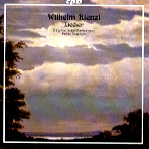Austrian composer Wilhelm Kienzl (1857-1941) may have been a musical admirer and personal friend of Wagner, but his real artistic influence–at least in his songwriting–was Schumann. (Indeed, it was Kienzl’s defense of Schumann’s music to Wagner that caused a break in their friendship–Wagner could not accept the idea that anyone could simultaneously appreciate his own art and Schumann’s.) Although we definitely hear a connection to those earlier, illustrious models, particularly in the accompaniments, the melodic writing in the Op. 16 and Op. 18 songs seems deliberate and undeveloped, lacking the inevitability and naturalness of line and phrasing that mark the truly outstanding works in the genre.
The melodies certainly become more flowing, the writing more assured as the composer gains more maturity, especially notable in the Op. 47 and Op. 55 selections. In fact, soprano Dagmar Schellenberger, whose voice can get shrill at louder, upper-register moments and who doesn’t always modulate her vibrato and moderate her tone with desirable subtlety, becomes almost a different singer in the beautiful little Op. 47 gems–Vier Japanische Lieder. She carries this delicately expressive singing into the next song, Wiegenlied der Bilitis, and shows even more dramatic range in the following Augenblicke (one of the Op. 55 group). Accompanist Peter Stamm can be heavy-handed (usually where Kienzl’s textures are extremely dense and volume is loud) or just as easily can be ultra-gentle and lyrical. The sound has a bit of a hard edge, but singer and pianist are well-balanced and not too close.
So, we have an interesting progression throughout this program that shows both the composer’s positive development as a songwriter and the singer’s seemingly inspired response to it. Stylistically, these pieces remain outside their time–the late 19th/early 20th centuries–but that doesn’t mean Kienzl had nothing original to say. The music at least proves sensitive to the various texts–by Wilhelm Cermak, Heinrich Heine, Pierre Louys, Robert Hamerling, and others–and at best really shows an affinity for vocal writing–Abendlied; the Japanese songs; Wiegenlied der bilitis. And there’s something to be said for a vocal composer (he also wrote operas) who in the 1920s gave up composition because he would not join the rising atonal movement–nor would he accept being criticized as old fashioned for continuing to be true to his own idiom.
































